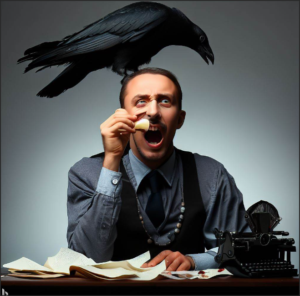by James A. Bacon
It is sweet indeed to read the latest Washington Post article about the Virginia Military Institute: after calling into question a top journalism award bestowed upon The Cadet independent student newspaper, media reporter Paul Farhi found himself gulping down a serious helping of crow in a follow-up story headlined, “VMI student paper award upheld after plagiarism, conflict-of-interest probe.”
The series of Cadet articles, which were critical of the VMI administration’s Diversity, Equity & Inclusion initiatives, won the Virginia Press Association’s top community service award — the first for a student newspaper in Virginia. Rather than praising the young journalists for their accomplishment, Farhi criticized them. He contended that the series of articles contained plagiarism and that the Cadet had failed to disclose a conflict of interest to judges.
But Conrad M. Shumadine, a retired Norfolk attorney hired to determine if there were grounds for canceling the award, wrote that the honor was made “in accordance with applicable rules and regulations and is not subject to an after-the-fact challenge…. An award should be a celebratory event not an invitation to disparagement.” (Read his report.)
The Cadet articles and their validation by a jury of journalists represented an implicit repudiation of the Post, which had devoted dozens of articles to contending that VMI was systemically racist, and attacking the critics of the Board of Visitors and Superintendent Cedric Wins (installed by former Governor Ralph Northam) for their implementation of Diversity, Equity & Inclusion. The Cadet, in turn, published numerous articles contesting the Post’s narrative.
The VPA jurists praised the Cadets‘ reporting. Stated the award presentation by the Virginia Press Association (quotes that Farhi never deemed worthy of citing):
These young people put their academic and professional careers on the line for what they believed…. Under the tenet “Seek Trust and Report It,” The Cadet staff did “examine their own cultural values and avoid [ed] imposing those values on others,” they did “give voice to the voiceless,” and they did “distinguish between advocacy and reporting.” And perhaps most importantly, under the tenet “Act Independently,” they were “vigilant and courageous about holding those with power accountable.”
The results of their efforts will not please everyone. It is likely that every stakeholder group at VMI has something with which they disagree in how the DEI [DOI] program was rolled out. But the staff of The Cadet made it possible for all the stakeholders to be heard, and that’s what good journalists do.
One last thought: It is clear from reading through the application that these student journalists were under tremendous pressure from a variety of sources as they pursued their objective “to seek truth and report it.” But in addition to their work as journalists, they were also cadets in a highly demanding and competitive environment with pressures of its own. The word that comes to mind is “courage.”
Neglecting to quote the judges, the Post took two potshots at The Cadet. In the first, it contended that an article “duplicated several sentences” from a news release issued two months earlier by a VMI alumni group, Protect Honor, that has opposed VMI’s DEI initiatives.
It is indeed standard journalistic practice to cite the sources for previously published material. However, context matters. It’s one thing if authors’ intent is to pass off the original ideas, phrasing, and wording of others as their own; it is another if they are replicating boilerplate language for background information, as appears to be the case in this instance.
The more substantive WaPo charge is that The Cadet journalists failed to inform the VPA in the materials they submitted that an article about a lawsuit filed by the Center for Applied Innovation, or CAI, was owned by their newspapers’ primary backer. CAI is owned by VMI alumnus Bob Morris, who has mentored the students and raised money for the independent newspaper through The Cadet Foundation, which he administers. In my opinion, journalistic ethics did require them to make that conflict of interest known to the judges.
However, there does not appear to have been any attempt to deceive. It was common knowledge within the VMI community that Morris was involved with The Cadet. Giving the student journalists the benefit of the doubt, it may not have occurred to them that they needed to bring the widely known relationship to the attention of the judges. It should have occurred to them, though, and they should have made the facts known. On the other hand, the Post never even tried to demonstrate how The Cadet‘s coverage of the lawsuit might have been biased by the Morris relationship.
Indeed, Post readers have been treated to the unedifying spectacle of one of the world’s largest, most influential newspapers attacking student journalists of a tiny independent newspaper.
The Washington Post tagline says, “Democracy dies in darkness.” It needs a kicker: “And we’re the ones putting out the lights.”



